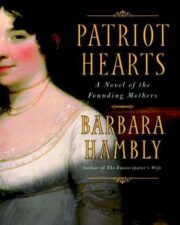If after waiting four and a half years to see John’s face, Abigail reflected, she and her daughter ended up drowned in the ocean a mere hundred miles from where he sat, her first act upon arrival in Heaven would be to ask God for an explanation, and it had better be a good one.
“It will be all right,” she said, stroking the girl’s fair curls. “It will be fine.”
On the third day the shaken, exhausted passengers crept forth onto the deck. Far off to port, Abigail saw a line of green-rimmed white cliffs, that shallowed to gray beaches and a gray-walled town, and white surf like the ruffle of a petticoat. Between surged an enormous expanse of monstrous gray waves that fell away into still more monstrous troughs, like chasms opening down Neptune’s root-cellar. The sails flapped and cracked like cannons. Spits of rain lashed her face as she stood. Overhead, the sky loured blacker still.
“We could stay beating here in the Channel for days, trying to get around into the Estuary,” explained Captain Lyde, looking more cheerful than he had any right to be considering that nobody on board had had more than an hour’s sleep in three days. “Since these gales sometimes blow for weeks, I’m having the pilot-boat lowered, to take you into Deal.” And he pointed to the wet-black huddle of roofs, the castle that poked up so improbably pale against the drenched green slopes of the hills. “You can get a post-chaise to Canterbury and then on to London, and can be there in a day.”
London, thought Abigail, dazed at the thought.
I’m going to be in LONDON…
In someplace that won’t sink under me, and drown me and Nabby before ever I see John again.
She looked down over the rail at the churning sea and her heart turned to water.
Only the thought of going down with the Active in the Channel, within touching distance of John’s hand, got Abigail down the jerking, swaying, wooden wall of the hull and into the pilot-boat. This lurched and knocked and veered from the ship’s side, leaving a gap of icy sea. Only her own courage, Abigail suspected, got Nabby, Esther, and The Other Mrs. Adams to follow her. The sailors at the oars seemed to treat the matter as all in a day’s work, but with what Abigail knew of Mr. Blunt’s cooking, she suspected life and death were as one to this crew.
Gray rain streamed down into the gray sea. The Other Mrs. Adams wailed that she was going to die, a prophecy she had made hourly for the past thirty days. As a wave the size of a church rose up under the boat like a wall, then dropped away to nothingness, Abigail was inclined to agree with her, though nothing would have induced her to say so. Soft-spoken fellow passenger Mr. Foster grabbed her in his arms and clung fast to the rail, Abigail embracing him as she’d only ever embraced John while spray and rain soaked them both to the skin.
Just let me see him again, she found herself praying. Just let me see him—
There was a noise like thunder and a wave swept the boat up broadside, black oars flailing in air. Mr. Foster’s arms tightened around her and Abigail shut her eyes, and the next instant the keel ground on pebbles.
She opened her eyes to see gray stone beach and emerald hill above her, sailors jumping from the boat to drag it farther up the beach, water the color of steel rushing around their bare shins.
It was Tuesday, the twentieth of July, 1784, and they were in England at last.
Rain began to fall at about noon. Nabby’s pains grew harder, yet the baby showed no signs of coming. Mrs. Throckle’s businesslike cheerfulness settled into a watchful quiet. Exhausted, Nabby clung to Abigail’s hands. Between pains she would ask about her aunt Mary or her cousins Bettie and Luce, or whether Mr. Jefferson had written from Paris—“Do you know if his little daughter is on her way to France, as he said she’d be?”


"Patriot Hearts: A Novel of the Founding Mothers" отзывы
Отзывы читателей о книге "Patriot Hearts: A Novel of the Founding Mothers". Читайте комментарии и мнения людей о произведении.
Понравилась книга? Поделитесь впечатлениями - оставьте Ваш отзыв и расскажите о книге "Patriot Hearts: A Novel of the Founding Mothers" друзьям в соцсетях.